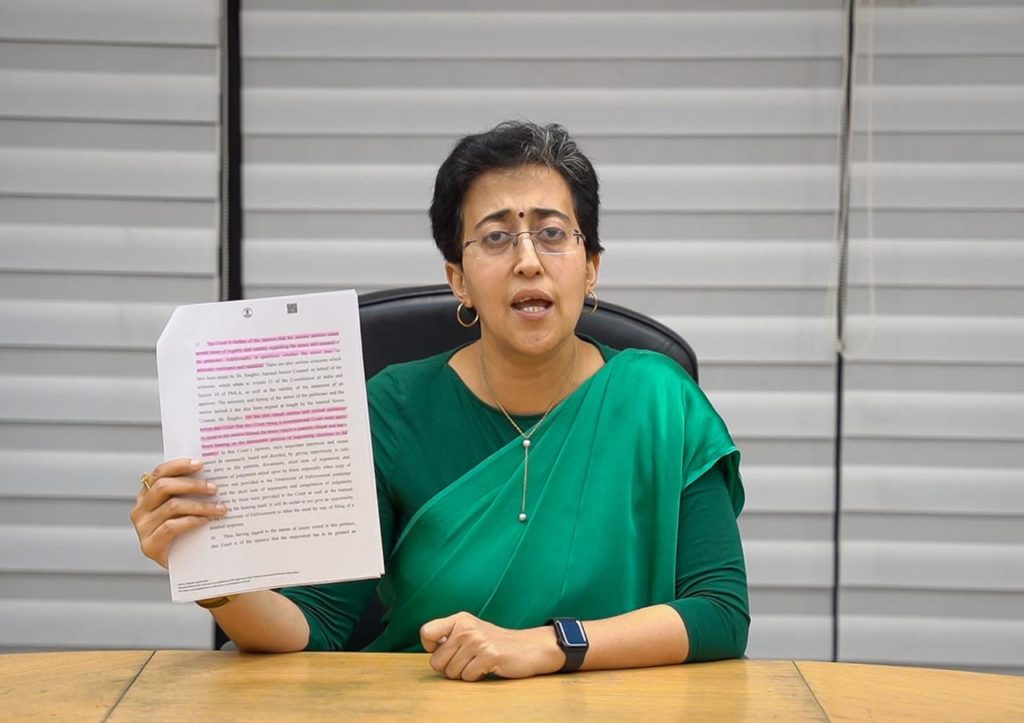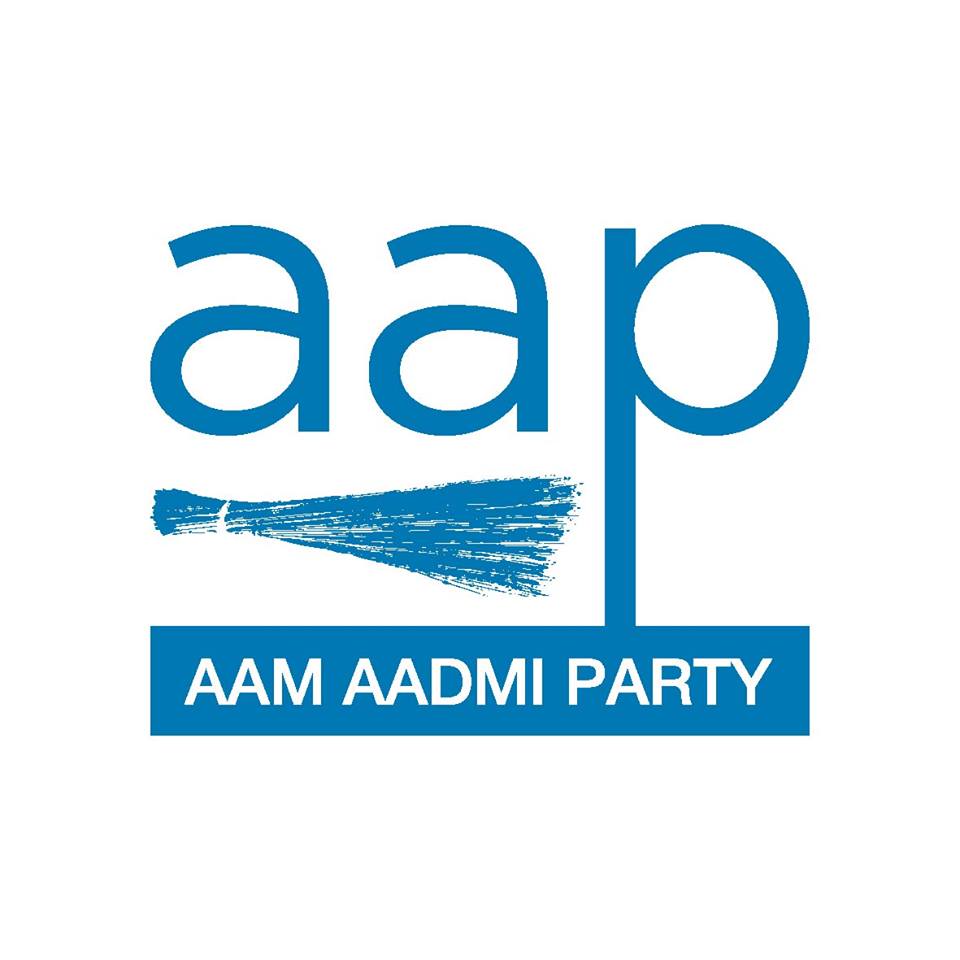NEW DELHI:
Clearing the clutter around the noises made by BJP regarding the President’s rule, Senior AAP Leader and Minister in the Kejriwal Cabinet Atishi unequivocally stated that no constitutional provision bars ‘governance from jail’, citing the law of the land i.e Representation of the People Act, 1951 and GNCTD Act.
The Delhi Minister affirmed it as a political conspiracy of the BJP-led Central Government to undermine democratically elected opposition governments using the Enforcement Directorate (ED), suggesting that opposition Chief Ministers could be coerced into resigning or face arrest under draconian sections of the PMLA.
Ms. Atishi emphasizes that the President’s rule should be a last resort, citing Supreme Court precedent. She asserted that the BJP is leveraging institutions such as the CBI, ED, and Election Commission to target opposition parties and leaders, particularly Shri Arvind Kejriwal. The Delhi Minister contends that Kejriwal is the only leader Narendra Modi fears and sees as a challenger.
AAP Senior Leader and Cabinet Minister in the Kejriwal Government, Ms. Atishi affirmed, “The Representation of People’s Act, 1951, clearly states about the disqualification of a Chief Minister or legislator- a person convicted for an offense and sentenced to two years or above shall be disqualified from the date of such conviction. This does not apply to a person who is only accused and has not been adjudged as guilty by a court of law. And the GNCTD Act is also very clear that one cannot continue serving as the Chief Minister if they have lost the majority in the house. In this case, none of these conditions are met, so under what conditions will President rule be imposed? It’s clearly an attempt as per the political conspiracy of the BJP. First they (BJP) arrest the Chief Minister in a fake case, and then demand resignation disrespecting people’s mandate. And if one doesn’t resign, then you (BJP) threaten to impose the President’s rule.
“Otherwise, it is a very simple formula to bring down all the opposition governments. You have the Enforcement Directorate (ED) in your hands, they don’t require any proof, and leaders don’t get bail when they get arrested under PMLA. So all opposition Chief Ministers will be arrested under PMLA. And they will be told that you either resign or we will bring down the government and implement President rule,” the Delhi Cabinet Minister added.
Minister Atishi further added that the law of the land is very clear. The President’s rule can only be imposed when there is no other choice. Issue of Article 356 has gone to the Supreme Court multiple times and it has repeatedly ruled that President rule can only be implemented only when there is no other choice left for the governance of that state. So if today the President’s rule is imposed, then it is very clear that it is a political vendetta. So as you can see that it is used by institutions after institutions to finish off the opposition.
“You have the CBI, the ED, the income tax department. You have the State Bank of India. The State Bank of India refused to give up electoral bonds. The Election Commission of India which is removing senior officers in all opposition states, the Home Secretary has changed, the DGP has changed, and they are neither touching the ED nor CBI. They are not touching the income tax department. The Aam Aadmi Party has been asking for time from the election commission for the past three days. We have not been given time. Delhi police are refusing to give permission for the rally we are having in Ram Leela Maidan,” Ms. Atishi said.
Questioning the intentions of the BJP-led Central Government, Ms. Atishi stated, “So what are we going to do? So you can see institution by institution is being used by the BJP to attack key opposition to attack Aam Aadmi Party, attack Shri Arvind Kejriwal. What this shows is that there is only one leader whom PM Narendra Modi is scared of, who he regards as a challenger. That leader is Shri Arvind Kejriwal.”
What does the Law of the Land state:
No bar against the Chief Minister continuing in the post while in custody
1). There is no express legal bar against a sitting Chief Minister continuing in the said post while being in custody, or conducting official responsibilities while under arrest.
2). The principle of presumption of innocence until proven guilty mandates that mere arrest cannot be the basis of the removal of a constitutional functionary. Disqualification only occurs upon conviction.
3). Representation of People’s Act, 1951 – Section 8(3) – disqualification of a legislator – a person convicted for an offence and sentenced to two years or above shall be disqualified from the date of such conviction. This does not apply to a person who is only accused and has not been adjudged as guilty by a court of law.
4). As per the Westminster model of governance, the people of Delhi have chosen the members of the Delhi Legislative Assembly, and the CM retains and commands the support of an overwhelming majority of these legislators, which gives him the constitutional and moral authority to run the government.
Suspension of Article 239AA
I. Under Article 239AB, the entirety of Article 239AA cannot be suspended.
a. Under Article 239AB, the President may “suspend the operation of any provision of Article 239AA or of all or any of the provisions of any law made in pursuance of that article”, such as the GNCTD Act. Thus, while “all” provisions of the GNCTD Act may be suspended in certain circumstances, “all” provisions of Article 239AA may not.
b. This is further clear from the fact that the President is empowered to “make such incidental and consequential provisions as may appear to him to be necessary or expedient for administering the National Capital Territory in accordance with the provisions of Article 239 and Article 239AA.” Therefore, the object of the exercise of power under Article 239AB is the administration of GNCTD in accordance with Articles 239 and 239AA, which cannot be achieved if the entirety of Article 239AA is suspended.
II. Conditions under Article 239AB are not satisfied.
a). Article 239AB does not necessarily require a recommendation from the Lieutenant Governor to the President. The President may exercise the power “on receipt of a report from the Lieutenant Governor or otherwise”.
b). However, Article 239AB has been described as “akin” to Article 356. Therefore, the power under Article 239AB can only be exercised in exceptional cases.
c). The President may exercise the power only if she is satisfied that:
i). A situation has arisen in which the administration of NCT “cannot” be carried on in accordance with Article 239AA or the GNCTD Act; or
ii). It is “necessary or expedient” to exercise the power “for the proper administration of the National Capital Territory”.
d). Neither condition is met in this case. “Expedient” refers to “whatever is suitable and appropriate for any reason for the accomplishment of the specified object. “3 The Chief Minister’s incarceration does not legally preclude him from performing his duties under Article 239AA(4) or Section 45 of the GNCTD Act. As elaborated in Points III-IV below, his arrest is also not a bar to continue as the Chief Minister of GNCTD.
III). No bar under the Constitution of India
a). Article 164(4) stipulates that a Minister will cease to be a Minister if, for six consecutive months, he is not a member of the State Legislature. A similar provision is made for GNCTD in Section 43(2) of the GNCTD Act, 1991.
b). Section 15(1) of the GNCTD Act, 1991 stipulates disqualifications for being a member of the Legislative Assembly. These disqualifications are attracted if the member (i) holds an office of profit under a government (clearly inapplicable), or (ii) is disqualified under a Parliamentary law (discussed in Point IV below).
c). Article 164(1B) stipulates a disqualification for being a Minister in a State. Similarly, Article 361-B stipulates a disqualification for holding a “remunerative political post”, including a Minister. These are attracted only if the member is “disqualified from being a member of the House under paragraph 2 of the Tenth Schedule” which deals with defection, which is not the case here.
IV. No bar under the Representation of the People Act, 1951
a). To determine disqualification, Section 15(1)(b) of the GNCTD Act, 1991 applies the Representation of the People Act, 1951 to members of the Legislative Assembly of Delhi.
b). Disqualifications under Section 8 of the Representation of the People Act, 1951 arise only upon “conviction” of one of the listed offences. Neither arrest nor accusation of an offence attracts a disqualification under Section 8.
c). The Supreme Court has refused to extend the disqualifications stipulated in the Constitution to include Ministers against whom charges have been framed in respect of serious or heinous offences. The same principle would govern disqualifications under the Representation of the People Act, of 1951.
Important aspects of President’s Rule under Article 356:
Existing precedent on Article 356 does not deal with situations such as this and are restricted to situations of the imposition of President’s Rule despite a party enjoying majority, or of dismissal of a government despite the opposition party possessing the requisite numbers. Precedent shows that as a general principle, it is the absence of democratic representation that leads to the President’s Rule. This is clearly absent in the present case as a duly elected Government continues to be in place

In article 356, “cannot be carried on in accordance with the Constitution”, “cannot” is to be read as an impossibility. It indicates that a mere impasse or a remediable situation is not covered.
‘In accordance with the Constitution’ covers a few situations, which need not be elaborated but broadly the Sarkaria Commission’s taxonomy is to be accepted viz. Political crises, internal subversion, physical breakdown, non-compliance with constitutional directions of the Union.

